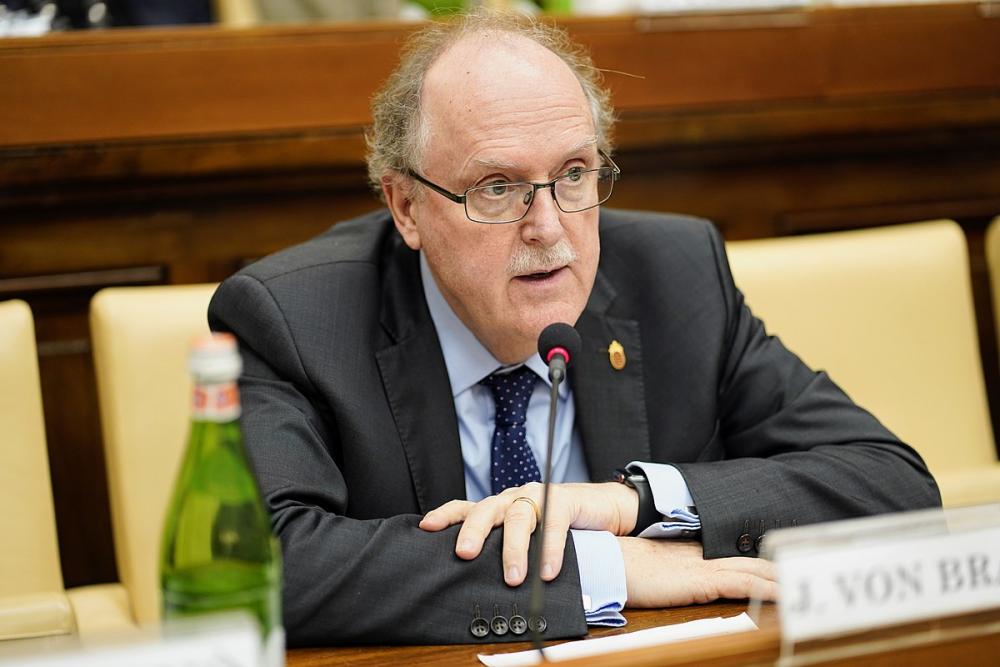Von Braun stressed that it is essential that the countries of the two regions increase their investment in research, considering that science and technology are key to achieving a more productive and resilient agriculture sector while protecting natural resources.
San Jose, 28 July 2022 (IICA) – Africa and the Americas must have a clear understanding of the role that the two continents can play in sustaining food and environmental security in the world. This is why they must unite and develop a joint vision on the transformation of agrifood systems as the only way to ensure that developed countries consider the south of the planet in accordance with its potential, its challenges and the size of its population.
This was stated by scientist Joachim von Braun, Director of the Center for Development Research and Professor of Economics and Technological Change at the University of Bonn, and one of the featured speakers at the Africa-America Ministerial Summit on Agrifood Systems, which is taking place in San Jose, Costa Rica.
Von Braun pointed out that the main lines of action of the two continents should include efforts to set an agenda that reflects their interests, the exchange of knowledge and experiences in science and innovation, unity in fostering reliable international food trade and the responsible use of natural resources, with an emphasis on the protection of the forests of the Amazon and the Congo.
“We need to change the way we see the world. Africa and the Americas can complement each other and have much to learn from one another. We are dealing with a multidimensional crisis, and transforming agrifood systems in the midst of a crisis is a difficult undertaking”, said von Braun, who, in 2021, spearheaded the scientific group that brought together nearly 50 experts for the UN Food Systems Summit.
Ministers, deputy ministers and senior officials of Agriculture, Environment and Science and Technology from some 40 countries are participating in the Africa-Americas Ministerial Summit on Agri-food Systems, with the aim of strengthening bi-regional cooperation to face the challenges of global food security and strengthen the role of both continents in terms of productivity.

Von Braun stressed that it is essential that the countries of the two regions increase their investment in research, considering that science and technology are the key to achieving a more productive and resilient agriculture sector while protecting natural resources.
In this sense, he explained that in Africa 0.3% of GDP is allocated to science whereas this percentage is 0.7% in Latin America. “At least 1% must be reached on both continents”, he considered.
For von Braun, some of the specific fields to target are: minimizing risks in agriculture and strengthening resilience, in particular regarding extreme weather events; promoting innovations to achieve more productive soils; caring for the land, the water, the agricultural genetic base and biodiversity; and promoting the bioeconomy as a way to facilitate the health of production systems and ecological well-being.
“We need to ask ourselves”, he stated, “in what direction we should go to produce in a sustainable and resilient manner while protecting the environment. This requires a larger transformation than the one we have engaged in so far, in order to build capacities, develop a financing agenda, promote fair trade in food exchange and serve the planet and the people in a responsible way”, he added.
Von Braun summarized the six main points that should be included in a joint Africa-Americas agenda: sustainable growth in agricultural production; climate resilience (including the protection of soils, ecosystems, water and forests); healthy diets and food safety; open, trustworthy and rules-based trade; funding for transformation; and science and innovation related to all of the above.
More information:
Institutional Communication Division
comunicacion.institucional@iica.int











